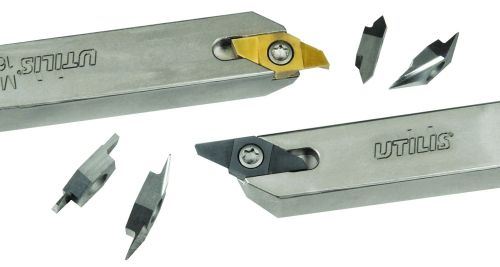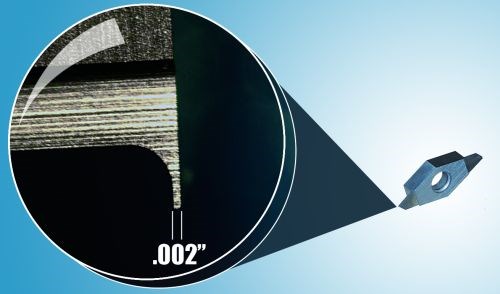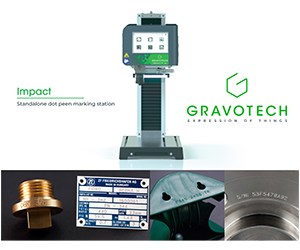In any turning application, grooving can be a critical, even challenging, operation. By its nature, grooving usually involves cutting with the narrow, outer edge of a thin, blade-like tool. When cutting deep grooves, such as to cut off a part, chips may have trouble passing through the cramped space between the walls of the groove.
A line of micro-grooving tools offered by Genevieve Swiss Industries (GenSwiss) of Westfield, Massachusetts, is designed to take grooving on Swiss-type lathes past previous limitations. For example, the line includes tools capable of cutting grooves to the thickness of a human hair (0.0019 inch). According to the company, grooving tools this fine have not been available commercially before. The line is intended to meet the design and production requirements of micro medical devices, dental implants, micro electronic components and other parts featuring micro grooves.
These micro grooving tools are produced in Switzerland as part of the Utilis Multidec 1600 series. Like other models in the Multidec line, these cutting tools come with toolholders that are designed to absorb cutting forces and protect cutting edges from shock and vibration. The inserts have two indexable cutting edges and are constructed of a micro-grained carbide grade that is said to be balanced for toughness and hardness properties. A variety of coatings can be tailored for the tough workpiece materials typically machined in Swiss-type applications, especially those smaller than 0.125 inch in diameter. Insert widths range from 0.0019 to 0.108 inch (0.05 mm to 2.75 mm) as standard products. Cutting edge repeatability is said to be within 0.0004 inch.
The availability of these micro grooving tools makes it unnecessary for Swiss-machine users to grind their own tools or modify existing tools. The handwork involved in producing or modifying tools in-house can be difficult and time-consuming, whereas the ready-to-use 1600-series tools offer an economical, more consistent alternative, the company says.
These tools are suitable for both prototype work and production jobs. They feature chipbreaker geometries to promote chip clearance. In addition to micro grooving, tools in this series can perform cut off, front turning, back turning, profiling, micro-threading and other applications, even on the smallest Swiss machines. Profile form tools to cut 0-80 pitch threads are also available. When paired with special ID toolholders, the inserts can perform axial grooving and ID work on large parts produced on larger machines as well.
Related Content
-
IMTS 2022 provides visitors the opportunity to meet with product experts to design automation solutions from scratch.
-
Old-world craftsmanship combines with precision machining on a vertical machining center and Swiss-type lathe to produce some of the only U.S.-made mechanical wristwatch movements.
-
The 11" bench engine lathe and gear head mill is able to handle a wide range of turning, milling and drilling operations typically found on much larger machinery.
.jpg;maxWidth=970;quality=90)






.jpg;maxWidth=300;quality=90)





.png;maxWidth=300;quality=90)

.jpg;maxWidth=970;quality=90)